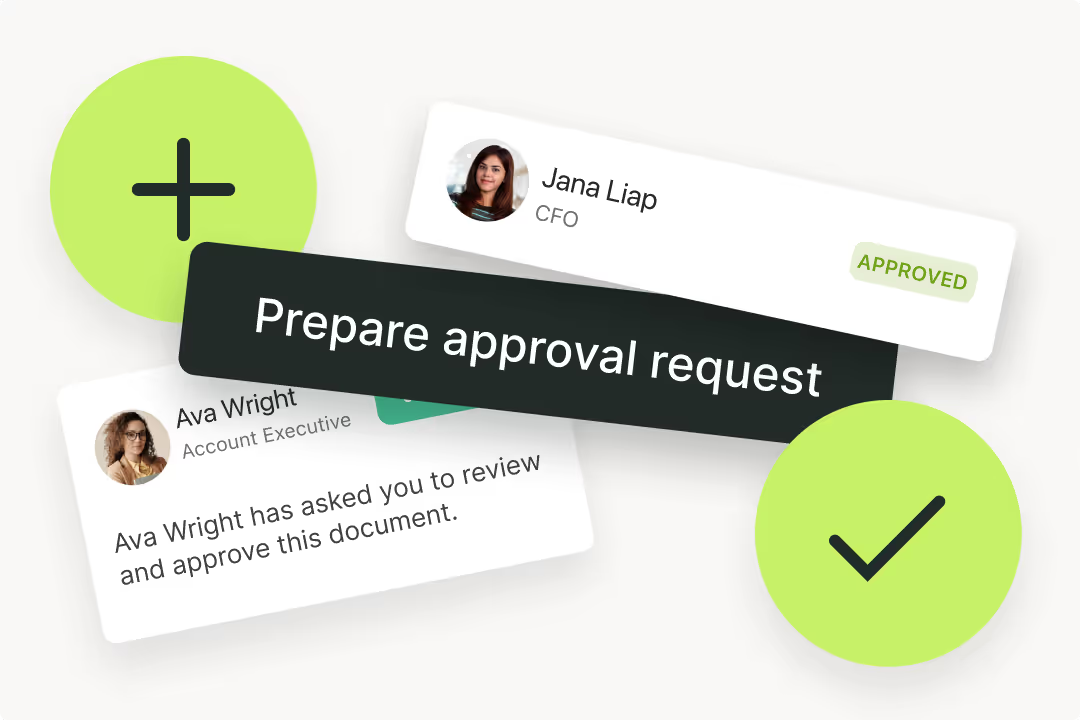Solutions
Customer Support
Resources
Procurement KPIs are metrics that help purchasing teams assess how effective their current processes are, and whether there are any bottlenecks to address.
These KPIs aren't just used to measure the performance of the procurement team. They're also used to assess supplier performance, enabling teams to de-risk their supplier portfolio.
In this guide, we'll cover seven of the most useful procurement KPIs to track in 2026, and how contract management tools can help.
This procurement KPI measures the success of cost-saving initiatives in procurement. It calculates the percentage reduction in costs achieved through negotiation, bulk purchasing, or other strategic measures.
It is one of the most important metrics for procurement specialists to track since their success is contingent on their ability to find more affordable vendors and negotiate better prices with existing ones. That's why it's often measured by comparing the costs before and after a negotiation.
It's also common for procurement teams to track the number of suppliers they work with, and the diversity of their supplier portfolio. This is because having a larger group of suppliers can derisk operations in the event that a supplier cancels on you at the last minute, or fails to deliver altogether.
Diversifying your sourcing also gives you leverage to negotiate better deals with other vendors as you have more options available to you.
But this doesn't mean you should work with as many vendors as possible. You should still evaluate vendors and their offerings carefully to make sure you're choosing reliable suppliers and ordering in quantities that unlock the best discounts. Just avoid putting all of your eggs in one basket!

Need help managing suppliers? Check out this list of supplier contract management tips for 2026.
The supplier defect rate is an important procurement KPI as it enables teams to evaluate the quality of good delivered by specific suppliers.
Tracking this KPI often means measuring the ratio of defective or substandard products to the number of products delivered in total. High supplier defect rates can prompt discussions with suppliers about their performance and, in some cases, result in a contract being terminated.
The supplier defect rate is particularly important in highly regulated industries where the risks associated with defective products are greater.
As the name suggests, emergency purchases are investments that the business make without thorough planning and out of necessity.
Usually, these purchases are made when there's a shortage of products available, which can happen due to poor forecasting or mistakes during previous orders, among other things.
Not all ad hoc purchases are a cause for concern, though. While last minute purchases do tend to be worse value for money, this procurement KPI should only be a red flag for businesses that make a lot of emergency purchases, and often.
Getting goods delivered on time is the goal for both the buyer and the seller. However, things don't always go to plan.
Measuring on-time deliveries enables procurement teams to track how many deliveries arrive after the agreed date, and identify vendors with a habit of making late deliveries. It's also a good indication of how reliable your vendors are, and whether you should re-evaluate your relationships with them.
This KPI is often measured by calculating how many deliveries are late out of the total deliveries made or units delivered.
This procurement KPI measures the extent to which parties involved in a contract adhere to the terms, conditions, and requirements specified.
It assesses the level of compliance with the agreed-upon terms and conditions throughout the contract's lifecycle, flagging things like missed obligations and late deliveries.
Contract management solutions like Juro can assist in tracking and analyzing contract compliance. To find out how, check out this guide to CLM software for procurement teams and this deep-dive on how to futureproof procurement contract management processes.

This KPI requires procurement teams to measure the amount of time between when an order is placed and received. As a result, the supplier lead time typically includes the time spent preparing, processing and shipping the order.
Tracking this data point gives procurement manager a better idea of how far in advance they need to place an order for it to arrive in time. It also helps them to manage their stock and inventory more effectively as a result.
It's difficult to track procurement KPIs without first having visibility into the contracts and purchase orders that govern your supplier relationships.
Yet, most purchasing teams don't have a single source of truth for contracts. Instead, they're scattered across shared and local drives, making them difficult to find and query.
With Juro, you can keep all your contracts in one place, making it easy to search for and report on terms. This means you'll no longer need to switch between two systems when working on first and third-party paper.
{{quote1}}
Instead, you'll have all of your contracts, and their metadata, captured in a secure contract repository. You can even set automated contract reminders to make sure you never miss a contract renewal deadline again.
Want to find out more about how procurement teams use Juro? Secure your personalized demo.

Common KPIs include cost savings, number of suppliers, supplier defect rate, emergency purchases, on-time delivery, contract compliance rate, and supplier lead time.
Most teams review procurement KPIs monthly or quarterly, depending on contract volume and supplier criticality.
Contract compliance rate measures how closely suppliers and internal teams follow agreed contract terms, such as pricing, delivery timelines, and obligations.
They highlight underperforming suppliers early — for example, through late deliveries or high defect rates — allowing teams to renegotiate or exit contracts before risk escalates.
CLM platforms like Juro centralize contracts and metadata, automate reminders, and make it easier to report on supplier performance and compliance.
Yes. Metrics like supplier lead time and emergency purchases help teams plan inventory more accurately and avoid last-minute, high-cost orders.
Procurement teams typically own KPI tracking, but insights should be shared with finance, legal, and operations to drive better decisions across the business.
Lorem ipsum dolor sit amet, consectetur adipiscing elit. Suspendisse varius enim in eros elementum tristique. Duis cursus, mi quis viverra ornare, eros dolor interdum nulla, ut commodo diam libero vitae erat. Aenean faucibus nibh et justo cursus id rutrum lorem imperdiet. Nunc ut sem vitae risus tristique posuere.

